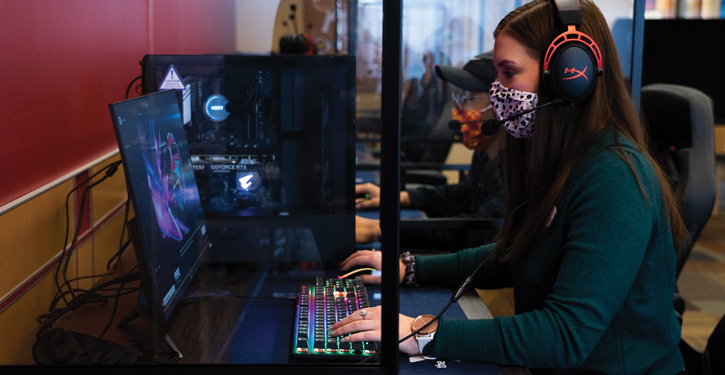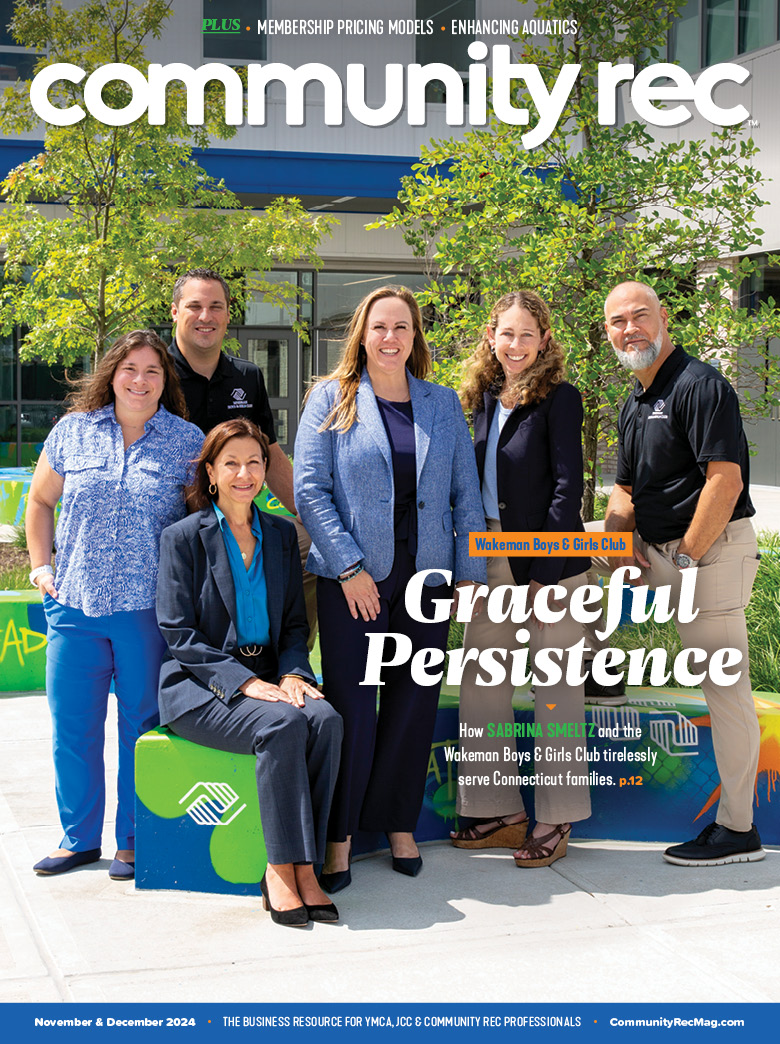How community rec centers are seeing success in esports programming.
Many rec centers are finding creative ways to make sure esports sessions go beyond sitting at a desk and staring at a screen. For the Gateway Region YMCA, this programming is an opportunity for participants to connect with one another and with other players around the country.
The Gateway Region YMCA is one participant in a league which includes other Ys in the central time zone, local Parks and Recreation groups, and the Saint Louis Science Center’s esports teams. Kids and coaches from Wisconsin to Texas are a part of this partnership.
“Esports is a really accessible sport,” said Laura Lytle, the executive director of the Campus YMCA, a branch of the Gateway Region YMCA. “It’s something someone can engage with anywhere, and it’s been an opportunity for us to build community around a shared interest.”
Participants can join at one of the Gateway Region YMCA’s three esports spaces — complete with keyboards and gaming chairs from HyperX — or they can join virtually. The Y uses Discord for monitored communication to provide a safe space to play. Kids compete and practice in private lobbies, and coordinators from various organizations help set up matches with everyone following the same rules.
However, working with technology can always present challenges that require quick problem solving. Some examples from Lytle include the internet going down during tournaments, firewall blocking necessary software and equipment problems.
A solution the league has come up with to mitigate some of these problems is having the first week of the eight-week sessions be a time to work out the kinks and hold scrimmages. Match results don’t affect brackets and all participants get the chance to make sure their technology is in working order. Having this time ensures everyone is on the same page and can properly participate.
“I think esports will only continue to expand,” said Lytle. “A lot of people are interested in participating as parents start looking for safe spaces for kids to game online. It’s also an excellent opportunity to embed some digital citizenship curriculum as well.”
One way the Y is doing this is by inviting a local cybersecurity partner to come share tips and information on how participants can keep their information safe online. Along with teaching kids about online safety, another YMCA is focusing on making sure esports athletes learn the same soft skills gained in traditional youth sports.
At the YMCA of the Foothills, Yung Chung, the esports coordinator, ensures kids learn as much about camaraderie and good sportsmanship as they do about video games. In esports, these values can be overlooked because opponents don’t play against each other in person.
“With gaming, it’s kind of tough because it’s anonymous when you’re playing online,” explained Chung. “There’s a toxic cultural element to it. I spend a lot of time teaching my team culture and what should and shouldn’t be said. Just because the screen is there doesn’t mean you can behave a certain way. There is respectfulness when it comes to gaming.”
Engaging in a healthy lifestyle is also encouraged, with exercise starting each session and stretching to end it. Chung also noted esports can be the gateway to participating in other youth sports for many kids.
“A lot of kids are interested in gaming which gets them into the Y and builds habits that keep their bodies healthy,” said Chung. “Especially with obesity rates being so high, it’s very important for children to learn about physical education. Gaming and esports are a great gateway toward trying other things.”
Another rec center seeing kids go from the esports lounge to the court and fields is the City of Port Orange Parks & Recreation. Along with tournaments on specific days, the rec center esports room is available for open play hours. Youth can sign up for 30-minute windows of play, and staff are seeing them form routines around that time in other areas of the rec center.
“You’d think the kids would be in the esports room all day, but they rotate in and out,” said David Perez, the recreation coordinator at the City of Port Orange Parks & Recreation. “They’ll play basketball for two to three hours, play some games when they get tired and then go back out to play. They also like to hang out so it’s a cool mixture that shows they’re not just sitting all day and doing nothing.”
Handling misconceptions and proving the value of programming like this has been a challenge for Parks and Rec and many esports leaders. To combat this, Chung highlighted the valuable skills participants gain from gaming. Some of these include better reaction time, hand and eye coordination development, and gaining access to a community of peers with similar interests. With a wide variety of video games out there — such as team-based, puzzle or story-building games — youth can gain valuable skills while finding what they’re interested in.
“How people view gaming can be very restrictive,” said Chung. “There are so many different genres of what games can be. They can build on skills of problem-solving, communication and team-building. These are all elements that exist in other sports.”
Similarly, parents can be swayed when they realize how passionate their child becomes after having a community with other gamers. Perez noted how many kids look forward to coming to the parks and rec center to hang out and play with friends which alter their parent’s view on esports.
“I had a kid choose to come to an esports tournament over LEGOLAND because his friends were playing,” explained Perez. “In general, many parents are apprehensive because they think their kid is going to waste all their time on the game, but then they see them making friends and developing critical thinking skills.”
The relationship building within esports programs — especially for kids who wouldn’t participate in traditional sports — is the biggest highlight of the program for Kyle Gay, the regional sports director, east of the YMCA of Greater Omaha.
“A lot of your esports kids will have never stepped in a YMCA before and they’ve never been a part of a traditional sports team,” said Gay. “We’re hitting a whole different target market with this group, and they’re learning life lessons about social responsibility and how to communicate with one another. I’ve seen them become social butterflies.”
Gay also explained how this plays into values of youth development, especially with participants on the autism spectrum. Kids who wouldn’t thrive in traditional sports environments can flourish in esports. Other success stories Gay has heard include the participants who grew up playing at the Y being hired as coaches after outgrowing the program, members playing esports in college and a group of kids raising $1,000 for their school from a gaming fundraiser.
“It means a lot to hear these success stories about kids we’re working with who didn’t have an outlet or something to do in their community,” said Gay. “As the Y’s social responsibility and youth development piece, we’re providing something for them and getting those kids into our building which can lead to further development.”
Esports pushes the boundaries of traditional recreation as the needs of modern members and youth change. There are many opportunities in the area to connect with more families and provide a safe space for collaboration and fun. Not only is it popular, but these programs show how it’s transformative for youth as well.










